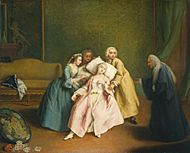Syncope facts for kids
| ICD-10 | R55. |
|---|---|
| ICD-9 | 780.2 |
| DiseasesDB | 27303 |
| eMedicine | med/3385 ped/2188 emerg/876 |
| MeSH | D013575 |
Syncope is the medical word for fainting or blacking out. It means you suddenly lose consciousness, usually for a short time. This often happens because your brain doesn't get enough oxygen for a moment. Sometimes, there are other reasons too.
Fainting is quite common. It often happens to teenagers and older people. About 40 to 50 percent of people will faint at least once in their lives. Fainting causes 1 to 3 percent of all visits to emergency rooms. It also leads to 1 to 6 percent of all hospital stays.
Contents
What Causes Fainting?
Fainting happens when your brain doesn't get enough blood for a short time. Blood carries oxygen and nutrients to your brain. If the blood flow drops too much, even for a few seconds, you can faint.
Common Reasons for Fainting
Many things can cause a person to faint. Most of these are not serious.
- Low blood pressure: Your blood pressure might drop suddenly. This can happen if you stand up too fast.
- Dehydration: Not drinking enough water can make your blood volume lower. This makes it harder for blood to reach your brain.
- Strong emotions: Feeling very scared, stressed, or surprised can sometimes cause fainting. This is called vasovagal syncope.
- Pain: Very strong pain can also trigger fainting.
- Overheating: Being too hot can make your blood vessels widen. This can lower your blood pressure.
- Skipping meals: Low blood sugar can make you feel weak and dizzy.
- Certain medicines: Some medicines can affect your blood pressure.
Less Common Causes
Sometimes, fainting can be a sign of a more serious health issue.
- Heart problems: Issues with your heart's rhythm or structure can stop enough blood from being pumped.
- Nervous system problems: Rarely, problems with the nerves that control blood pressure can cause fainting.
What Happens When You Faint?
Before you faint, you might feel certain things. These are called warning signs.
Warning Signs of Fainting
You might feel one or more of these before you black out:
- Feeling dizzy or lightheaded.
- Feeling nauseous or sick to your stomach.
- Sweating a lot.
- Having blurry vision or seeing spots.
- Feeling weak or tired.
- Having ringing in your ears.
- Feeling warm or flushed.
During and After Fainting
When you faint, you lose consciousness. You might fall down. Your body will usually lie flat. This helps blood flow back to your brain. Most fainting spells last only a few seconds to a minute. When you wake up, you might feel confused or tired for a short while.
What to Do If Someone Faints
If you see someone faint, it's important to act calmly and quickly.
Helping Someone Who Has Fainted
- Lie them down: Gently help the person lie flat on their back.
- Raise their legs: Lift their legs about 12 inches (30 cm) higher than their heart. This helps blood flow to the brain.
- Loosen tight clothing: Undo any tight collars or belts.
- Check for breathing: Make sure they are breathing normally.
- Stay with them: Do not leave them alone.
- Call for help: If they don't wake up quickly (within a minute or two), or if they hit their head, call for emergency medical help.
After They Wake Up
- Help them sit up slowly: Once they wake up, let them rest for a few minutes. Then, help them sit up slowly.
- Offer water: Give them some water to drink if they can swallow.
- Get medical advice: Encourage them to see a doctor. This is important to find out why they fainted.
Preventing Fainting
There are many simple ways to help prevent fainting.
- Stay hydrated: Drink plenty of water throughout the day.
- Eat regularly: Don't skip meals. Eat balanced meals to keep your blood sugar steady.
- Stand up slowly: If you've been sitting or lying down, get up slowly.
- Avoid overheating: Stay cool in hot weather. Wear light clothing.
- Know your triggers: If you know what makes you faint, try to avoid it.
- Listen to your body: If you feel warning signs, lie down or sit with your head between your knees.
If you faint often, or if you have other health concerns, it's always a good idea to talk to a doctor. They can help figure out the cause and suggest the best ways to stay safe and healthy.
 | Selma Burke |
 | Pauline Powell Burns |
 | Frederick J. Brown |
 | Robert Blackburn |


